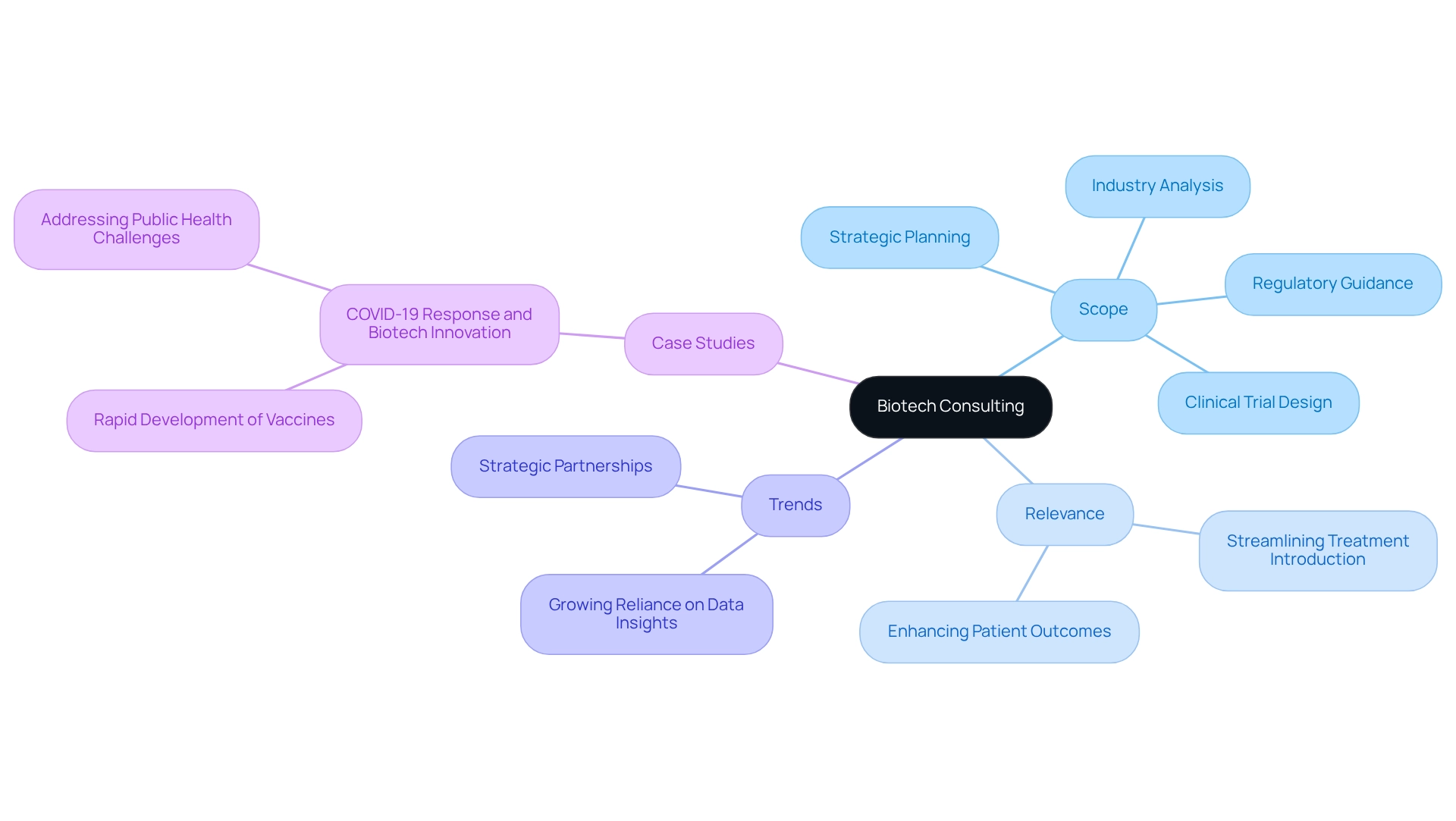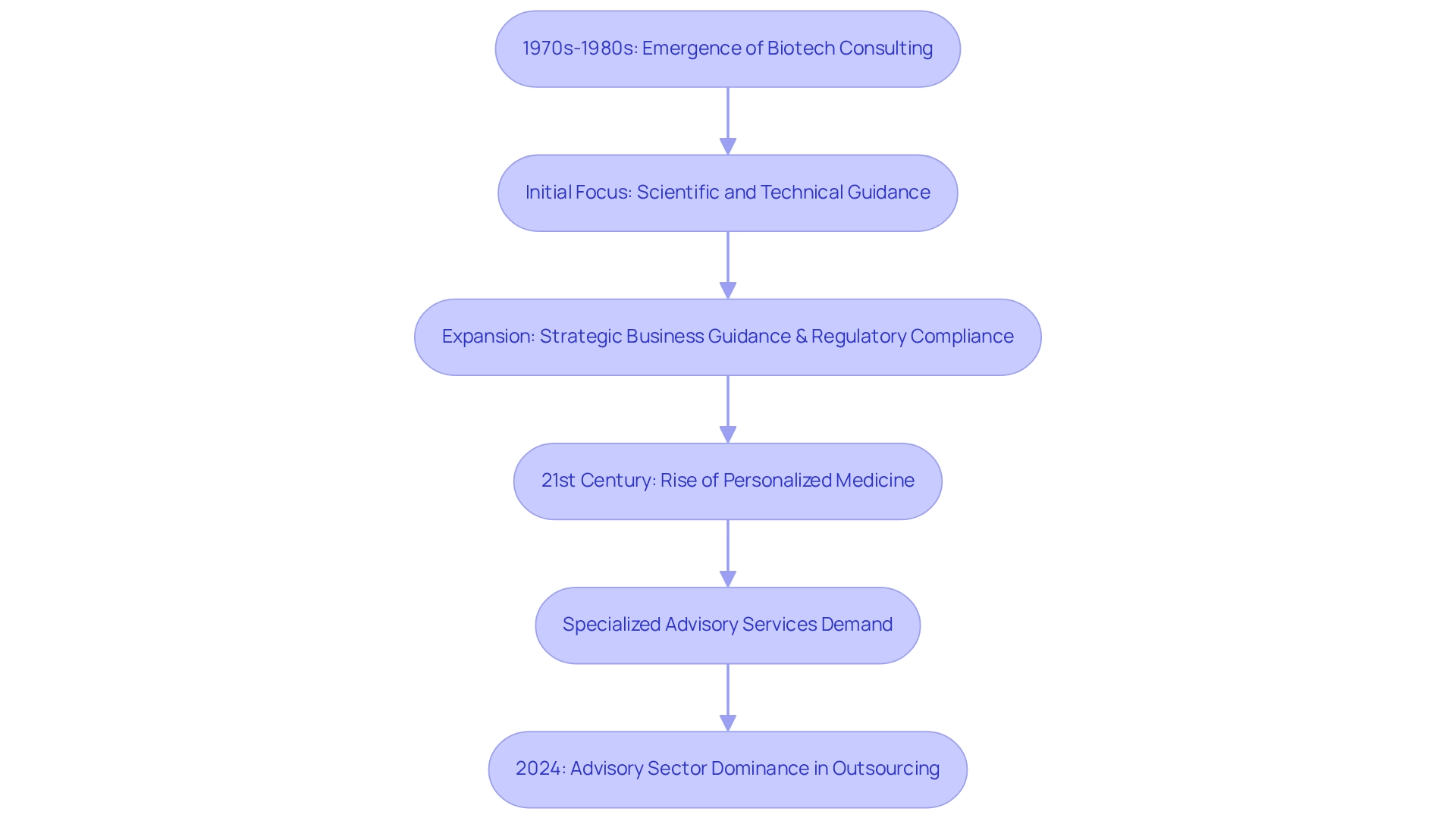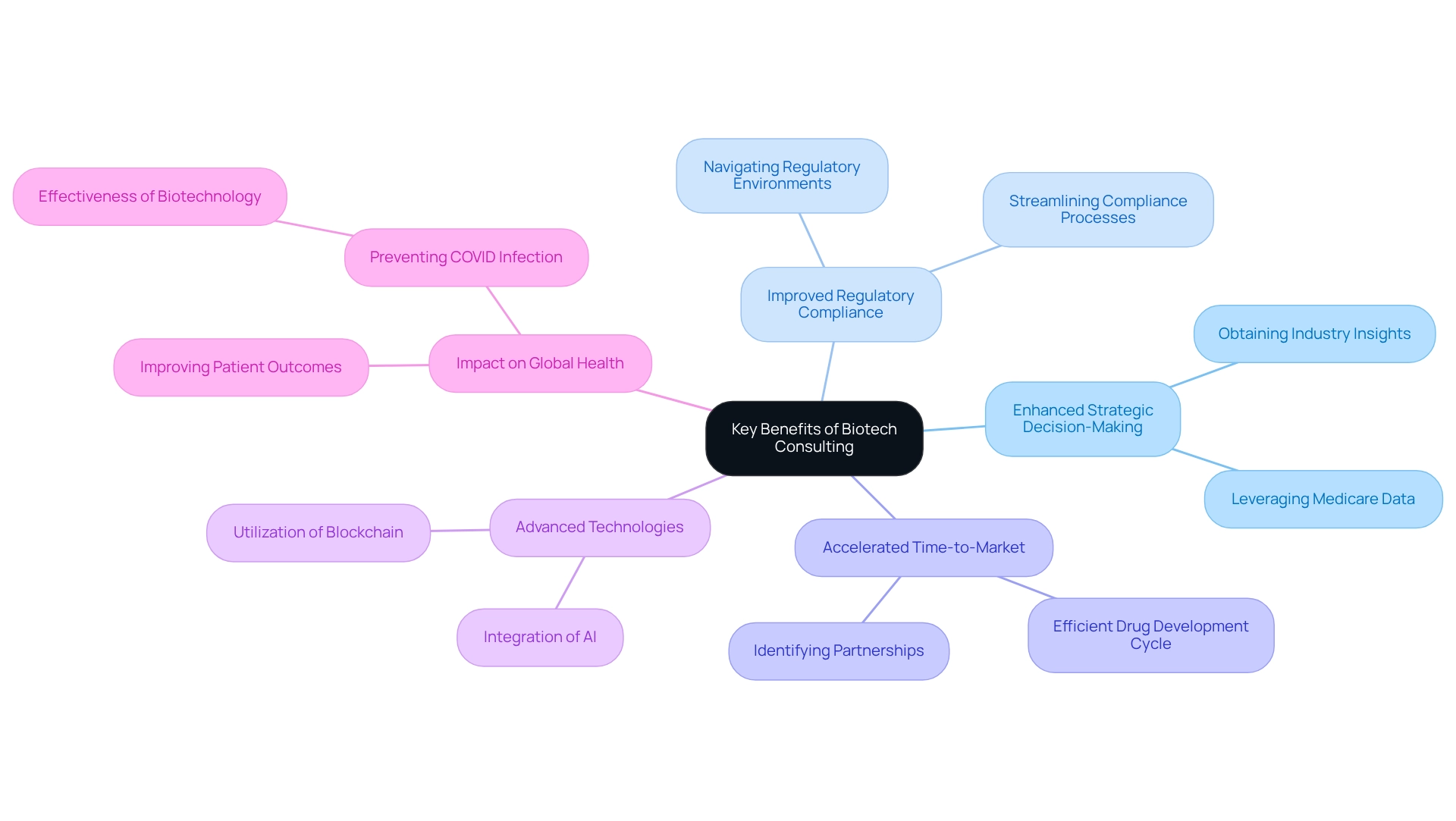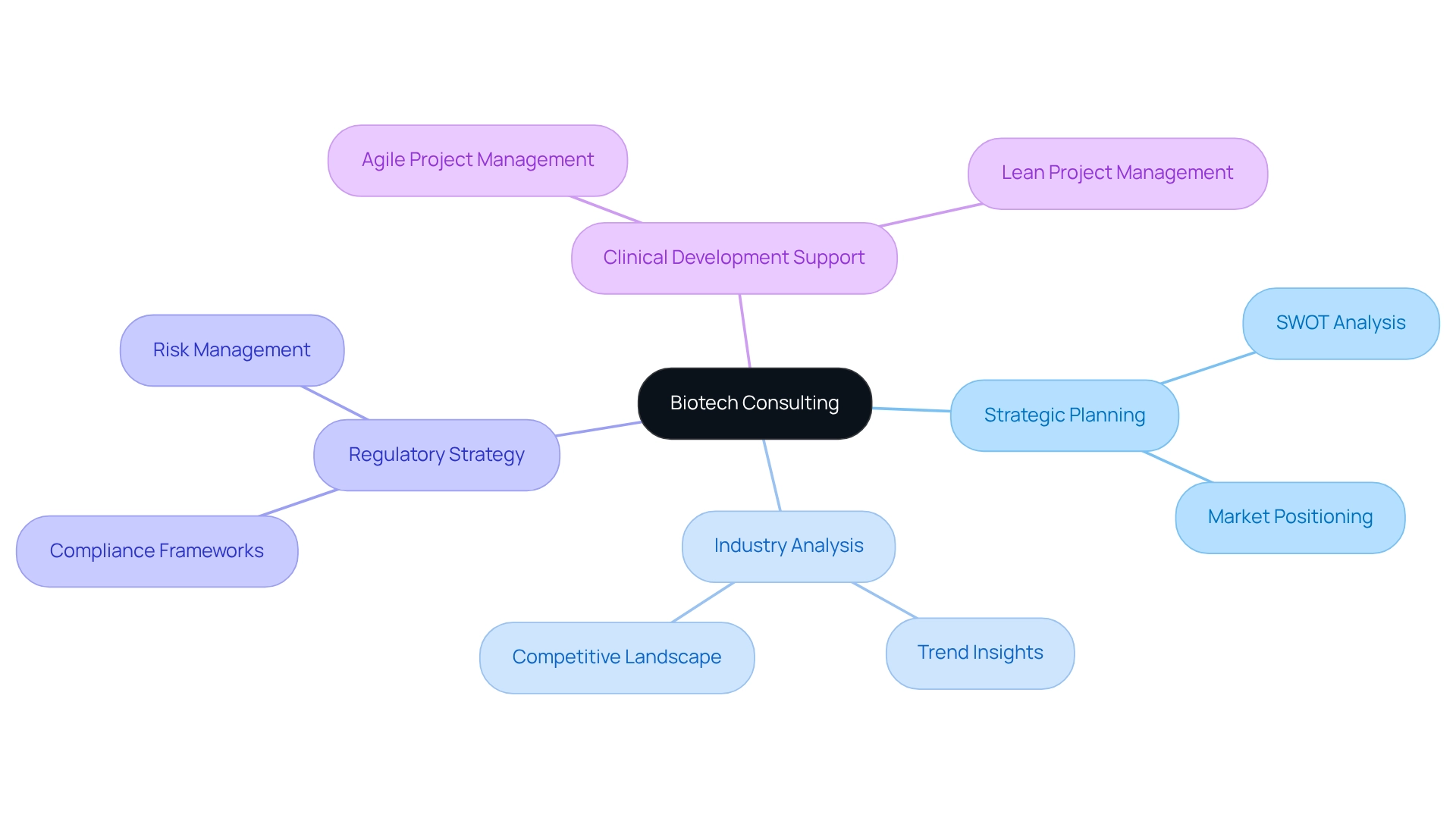Overview
Biotech consulting plays a pivotal role for pharmaceutical companies, offering essential guidance on drug development, regulatory compliance, and market access. This support is instrumental in streamlining the introduction of new treatments. As the pharmaceutical landscape becomes increasingly complex, the necessity for strategic insights is underscored, particularly as companies navigate pressures to accelerate timelines while adhering to regulatory standards. The importance of these consulting services cannot be overstated, as they provide the expertise required to successfully maneuver through the intricacies of the industry.
Introduction
In the rapidly evolving landscape of pharmaceuticals and biotechnology, biotech consulting has emerged as a critical component for success. As companies strive to navigate the complexities of drug development, regulatory compliance, and market access, these specialized advisory services provide invaluable insights and strategies. By streamlining the journey of new therapies to market and optimizing R&D efforts, biotech consulting is reshaping the operations of pharmaceutical firms. Furthermore, with the integration of advanced data analytics and innovative methodologies, consulting services are enhancing decision-making and driving significant improvements in patient outcomes. As the industry encounters increasing pressures and opportunities, understanding the scope and relevance of biotech consulting becomes essential for any organization aiming to thrive in this competitive arena.
Define Biotech Consulting: Scope and Relevance to Pharmaceuticals
Biotech consulting encompasses essential guidance services tailored for biotechnology and drug companies, aimed at navigating the intricate landscape of drug development, regulatory compliance, and market access. This advisory includes a spectrum of vital activities such as strategic planning, industry analysis, clinical trial design, and regulatory guidance. The significance of life sciences consulting for medications is underscored by its capacity to streamline the introduction of new treatments, thereby enhancing patient outcomes and fostering innovation within the healthcare sector.
In recent times, the role of life sciences consulting has become increasingly pivotal, particularly as the drug development sector faces mounting pressures to accelerate timelines while adhering to stringent regulations. For example, the return on investment in biopharmaceutical late-stage R&D pipelines has been closely scrutinized from 2013 to 2023, revealing trends that underscore the need for expert guidance in navigating these complex processes. This period has highlighted a fluctuating return on investment, emphasizing the demand for strategic insights to bolster R&D efforts.
CareSet’s comprehensive healthcare data insights are instrumental in empowering drug and life sciences companies to make informed decisions. By harnessing Medicare data, CareSet equips stakeholders with actionable insights that enhance pharmaceutical lifecycle management and optimize market access strategies. Case studies, such as the rapid development and distribution of COVID-19 vaccines, illustrate the adaptability and ingenuity that life sciences advisory can facilitate. This response not only showcased the critical role of life sciences in addressing public health challenges but also highlighted how advisory services, bolstered by data insights from CareSet, can enhance the efficiency of drug development strategies. Moreover, Eli Lilly’s significant investment increase in its Lebanon site—from USD 3.7 billion to USD 9 billion—reflects the growth potential within the life sciences sector. Such investments accentuate the strategic importance of biotech consulting services in assisting firms to identify and capitalize on lucrative opportunities.
As the sector evolves, prevailing trends in biotech consulting for medicines in 2025 indicate a growing reliance on data-driven insights and strategic partnerships. Companies are increasingly recognizing the value of these advisory services to secure a competitive edge and accelerate growth. Expert opinions suggest that biotechnology firms are often targets for acquisitions or collaborations by larger pharmaceutical corporations, further highlighting the strategic relevance of advisory roles in this industry. Overall, biotech consulting services are indispensable for pharmaceutical companies striving to adeptly manage the complexities of drug development, ensuring that innovative treatments reach patients promptly, supported by data-driven insights from CareSet.

Trace the Evolution of Biotech Consulting in the Pharmaceutical Sector
The evolution of biotech consulting services began in the 1970s and 1980s, coinciding with the emergence of biotechnology as a distinct sector. Initially, advisory services primarily focused on providing scientific and technical guidance. However, as the industry matured, the scope of these services expanded significantly to include strategic business guidance, regulatory compliance, and access strategies. This transformation was driven by the increasing complexity of the life sciences landscape and the necessity for companies to adapt to evolving market dynamics.
In the 21st century, the rise of personalized medicine and advanced therapies has intensified the demand for specialized advisory services. Companies dedicated solely to biotech consulting have emerged, playing a vital role in assisting drug firms in navigating complex regulatory landscapes and enhancing product development processes. Notably, the advisory sector represented the largest share in the biotechnology and drug services outsourcing field in 2024, underscoring the growing reliance on professional advice amid heightened mergers and acquisitions and evolving regulatory standards.
Data indicate that spending on specialty products rose by 11.7% in 2022, constituting 55% of total expenditure in the medicines market. As one expert noted, “Specialty drugs continue to dominate the landscape, with significant growth outpacing traditional medications.” This trend underscores the importance of advisory services in helping companies effectively manage their portfolios and capitalize on emerging opportunities. Furthermore, the average yearly expenditure on drug development by the leading 20 drug companies is approximately $60 billion, highlighting the financial stakes involved in life sciences advisory.
As the industry evolves, the role of biotech consulting firms will remain crucial in shaping strategies that enhance access and drive innovation in drug development. CareSet’s extensive healthcare data insights can empower these companies by providing actionable information that facilitates informed decision-making throughout the drug development process. The strong presence of established CMOs and CROs in North America further emphasizes the competitive landscape of biotech consulting services and the implications for access strategies.

Identify Key Benefits of Biotech Consulting for Pharmaceutical Companies
Biotech consulting provides pharmaceutical companies substantial advantages, particularly when integrated with CareSet’s comprehensive Medicare data solutions. These solutions facilitate enhanced strategic decision-making, improved regulatory compliance, and accelerated time-to-market for new products. By leveraging the specialized expertise of consultants alongside CareSet’s data insights, companies can obtain valuable perspectives on evolving industry trends, refine clinical trial designs, and skillfully navigate complex regulatory environments. The incorporation of advanced technologies such as AI and blockchain, alongside CareSet’s data capabilities, is transforming traditional research processes, enabling more efficient data management and analysis. This transformation underscores the critical need for understanding the drug development CMC process, which is essential for achieving successful outcomes.
Moreover, biotech consulting advisors, in collaboration with CareSet, play an indispensable role in identifying potential partnerships and collaborations required to access new opportunities and innovative technologies. This cooperative approach not only streamlines the drug development process but also ensures that products are better aligned with consumer needs. As Olivia Frost articulates, “Biopharmaceutical consultants’ expertise and experience are essential for companies looking to positively impact global health.” Statistics indicate that biotechnology can prevent COVID infection by as much as 98%, underscoring the vital role of effective guidance in addressing urgent health challenges.
Ultimately, these advantages culminate in a more efficient drug development cycle, resulting in improved patient outcomes and a stronger competitive position. Case studies highlight how firms prioritizing biotech consulting services, particularly those exemplified by CareSet’s commitment to data quality and transparency, have achieved significant improvements in regulatory compliance and strategic alignment, reinforcing the necessity of expert guidance in the pharmaceutical industry.

Examine Components and Methodologies of Biotech Consulting
Several essential elements are encompassed in biotech consulting, including:
- Strategic planning
- Industry analysis
- Regulatory strategy
- Clinical development support
These components are vital for navigating the complexities of the pharmaceutical landscape. Consultants employ data-driven approaches, leveraging advanced analytics and comprehensive industry research to inform their decision-making processes. For instance, frameworks such as SWOT analysis (Strengths, Weaknesses, Opportunities, Threats) are frequently utilized to assess a company’s competitive standing and uncover strategic possibilities.
Moreover, methodologies like Agile and Lean project management are critical for ensuring adherence to drug development schedules and optimizing resource allocation. The importance of these methodologies is underscored by the substantial financial stakes in the biotechnology sector, with nearly $460 billion in global biotechnology drug sales generated in the U.S. and Europe. This financial landscape highlights the necessity for precise and informed approaches in biotech consulting, as firms must adapt swiftly to industry shifts and regulatory demands, while innovative Medicare data solutions from CareSet play a pivotal role in enhancing drug strategies. By leveraging comprehensive insights and patient journey mapping, CareSet empowers drug companies to make evidence-based decisions that propel progress in healthcare. Their commitment to data-informed approaches ensures that therapeutic interventions reach those who need them most efficiently, ultimately improving patient outcomes.
Industry-specific resources are crucial in delivering insights into trends, enabling consultants to craft customized strategies that align with current industry dynamics. Case studies illustrate the impact of these methodologies; for example, smaller life sciences companies often become acquisition targets for larger drug firms seeking to enhance their product pipelines. Such mergers and acquisitions not only facilitate the rapid advancement of drug development but also enable the introduction of innovative therapies to the market more effectively. By integrating these components and methodologies, pharmaceutical companies receive invaluable support from biotech consulting firms, in conjunction with innovative data solutions from CareSet, throughout the drug development lifecycle, ultimately driving growth and enhancing patient outcomes.

Conclusion
The landscape of biotechnology and pharmaceuticals is increasingly complex, rendering biotech consulting an essential asset for companies striving to excel. Through strategic planning, regulatory guidance, and market analysis, biotech consulting optimizes drug development processes, enhances compliance, and accelerates time-to-market for innovative therapies. The integration of advanced data analytics, particularly via platforms like CareSet, empowers pharmaceutical firms to make informed decisions and adeptly navigate evolving market dynamics.
As the industry progresses, the role of biotech consulting is poised for further expansion, propelled by trends such as personalized medicine and the growing importance of specialty drugs. The financial stakes in drug development highlight the necessity for expert guidance in maneuvering through this intricate landscape. Companies leveraging biotech consulting not only refine their R&D initiatives but also strategically position themselves for growth and innovation.
Ultimately, the synergy between biotech consulting services and comprehensive data insights is vital for ensuring that new therapies reach patients efficiently and effectively. As the demand for innovative solutions escalates, the significance of these consulting services will only intensify, solidifying their role as key drivers of success in the pharmaceutical sector. Embracing this expertise can lead to improved patient outcomes and a more robust competitive advantage in an ever-evolving marketplace.


